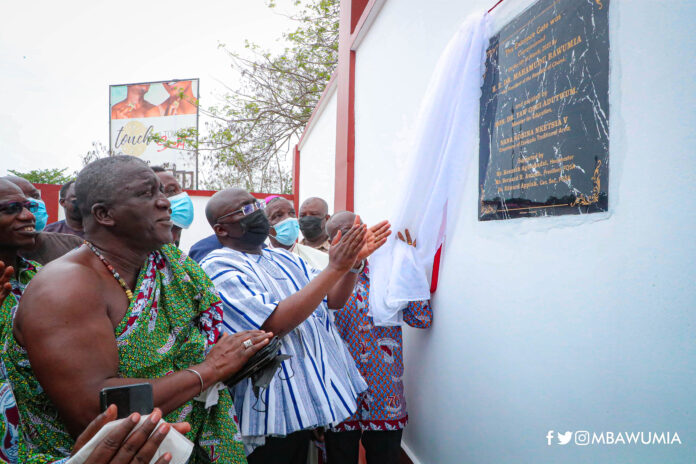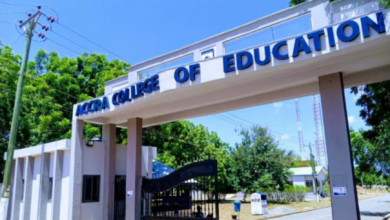Bawumia cuts sod for first ‘21st Century Model STEM JHS’

Vice President Mahamudu Bawumia has cut sod for work to begin on the first of planned nationwide construction of model STEM (Science, Technology, Engineering and Mathematics)-based Junior High Schools at Essikado in the Western Region.
Known as the ‘21st Century schools’, they are designed to equip the youth at their formative stages with the necessary foundation on which to acquire the skills and knowledge – at the Free SHS or Free TVET level and beyond – required to hold their own and properly compete for excellence in the Fourth Industrial Revolution, which is underpinned by science.
The Model STEM JHS form part of a broad, ongoing effort designed to reform Ghana’s educational system and make it more responsive to the development needs of the nation and produce the critical mass of human resource necessary to drive the national development agenda.
When fully completed, the Essikado Model JHS and all subsequent ones will have five laboratories to provide practical training in Biology, Physics, Chemistry, Computer Science, and Robotics and Artificial Intelligence. It would also have facilities to train hundreds of pupils, dormitories, recreational and accommodation facilities for both students and teachers.
Speaking ahead of the sod cutting ceremony on Saturday, 5th March 2022, which was also attended by the Omanhene of Essikado, Nana Kobina Nketsiah V, MP for Essikado Ketan, Hon Joe Ghartey, Deputy Minister for Education, Hon Rev John Ntim Fordjuor, Vice President Bawumia insisted that Ghana cannot afford to be left behind in the Fourth Industrial revolution, hence the decision by the Akufo-Addo Government to reform the education sector and invest heavily in STEM education.
“We were left behind in the earlier Industrial revolutions. What we cannot afford to do is to be left behind in the Fourth Industrial Revolution, which is underpinned by science, and therefore it is very important that we put in place all the building blocks that will allow Ghana to fully participate in the Fourth Industrial Revolution.
“But full participation means building the strong foundations. Yes, we’ve got to get our children in school and this is why we are putting in place Free Senior High School and Free TVET. But we also need to make sure that the foundations of science are there right from the beginning of the Second Cycle, at the Junior High School level.
“So the Ministry of Education as part of its vision of re-imaging education is re-positioning the entire educational system to produce a critical mass of assertive and empowered Ghanaian students with essential skills for socio-economic transformation.
“The skills that we need to inculcate in our students include critical thinking, problem-solving, creativity, communication, collaboration, data literacy and digital and computer science which have been drawn from the broad pillars of foundational literacies, competencies and character qualities of the 21st century.”
“STEM education goes beyond school subjects; it gives a skill set that governs the way we think and behave,” he explained. “Merging science, technology, engineering and mathematics education would help students solve challenges the country faces today.
“The STEM approach we are promoting to education fosters creativity and divergent thinking alongside fundamental disciplines and motivates and inspires young people to generate new technologies and ideas.
“Ultimately Ghana’s economic development and stability are dependent on our ability to invent and develop new products. This requires technological innovation which is obtainable through the expertise of specialists with knowledgeable science, technology, engineering and mathematics research,” he emphasized.





